________________
42
INTRODUCTION TO ARDHA-MĀGADHI
[S. 70.
Pischel supposes
palatals. The case of viis difficult to explain. that the semi-vowel first became y.
71 MUTES AND LIQUIDS
A. When the mute is followed by a liquid 7 or as, the mute assimilates it and the assimilation is progressive.
(i) Groups with र : चक्र = चक्क wheel; न्यग्रोध = नग्गोह banyan tree; ama = 3ale smells; 29 = ao thunderbolt; 2=894€ name of a prophet of good lustre'; 377= 3754 cloud; gET= पुत्त son; शूद्र =सुद्द low caste man; चित्र = चित्त picture ; पन = पत्त leaf ; भद्र = भद्द good; समुद्र = समुद्द ocean; उग्र = उग्ग terrible.
(ii) Groups with : 1g=, white; fata = farena trouble; resas = Aegy barbarian; eq=2 to swim; a = कीव eunuch.
72 CEREBRALISATION: The 7 as a second member changes the preceding dental into a cerebral in few cases. 969 = El young; fsg = reş hole.
73 In a number of adverbs a apparently becomes : 999 = Opret where; 49 = cry where; 79= TRUT there; a= सव्वत्थ everywhere; अत्र= एत्थ here.
Pischel derives ettha from Vedic itthā and naturally all other adverbs are traced to such a suffix -tthā. Geiger traces the word to *itra Av. ithra. The change of tra to ttha must have been under the influence of -ttha coming from Sk. -stha.
As pointed out by Meillet the Sanskrit orthography of a mute + a semi-vowel or a liquid does not give the real pronunciation of the word. Sk. aśvaḥ is represented in Gr. by hippos and madhyah by méssos where all the words have the first syllable closed. As a 'Sanskrit word can begin with the group tr-(trih, trāyasva) the second syllable must begin with tr- in putra and if the first is also a closed syllable it must end with t with the result that we get the gemination of the stopt, and the word is pronounced as put/traḥ, becoming in Prākrit putto.




